Category: Great Fast-Lent
Tuesday of the First Week of the Great Fast
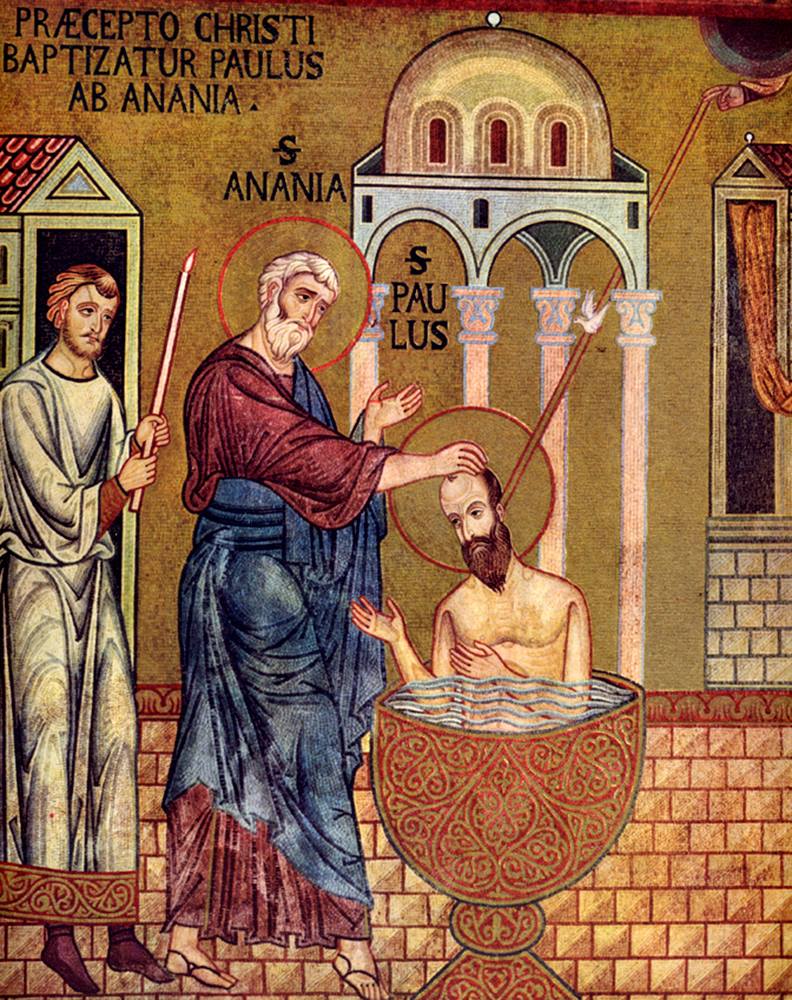 What does it mean to be a Christian, a follower of Christ? The stichera today remind us of our life in Christ in the holy sacramental mysteries. We anoint ourselves, when chrismated with “the seal of the gift of the Holy Spirit,” but this means virtue. We are baptized, washed with the consecrated water, but it is the water of purity. We are partakers of the Lamb of God, we partake of the sacrifice, we partake of the resurrection, but this is “the brightness of virtue and the goodness of our deeds.” Yes! We need to fast, to deny ourselves, but the fasting itself is not the goal, but our transformation by God’s love into a people that is holy and pure and good.
What does it mean to be a Christian, a follower of Christ? The stichera today remind us of our life in Christ in the holy sacramental mysteries. We anoint ourselves, when chrismated with “the seal of the gift of the Holy Spirit,” but this means virtue. We are baptized, washed with the consecrated water, but it is the water of purity. We are partakers of the Lamb of God, we partake of the sacrifice, we partake of the resurrection, but this is “the brightness of virtue and the goodness of our deeds.” Yes! We need to fast, to deny ourselves, but the fasting itself is not the goal, but our transformation by God’s love into a people that is holy and pure and good.
Icon: Baptism of St. Paul
Meditation by Archpriest David Petras
The beginning of the Great Fast (Lent)
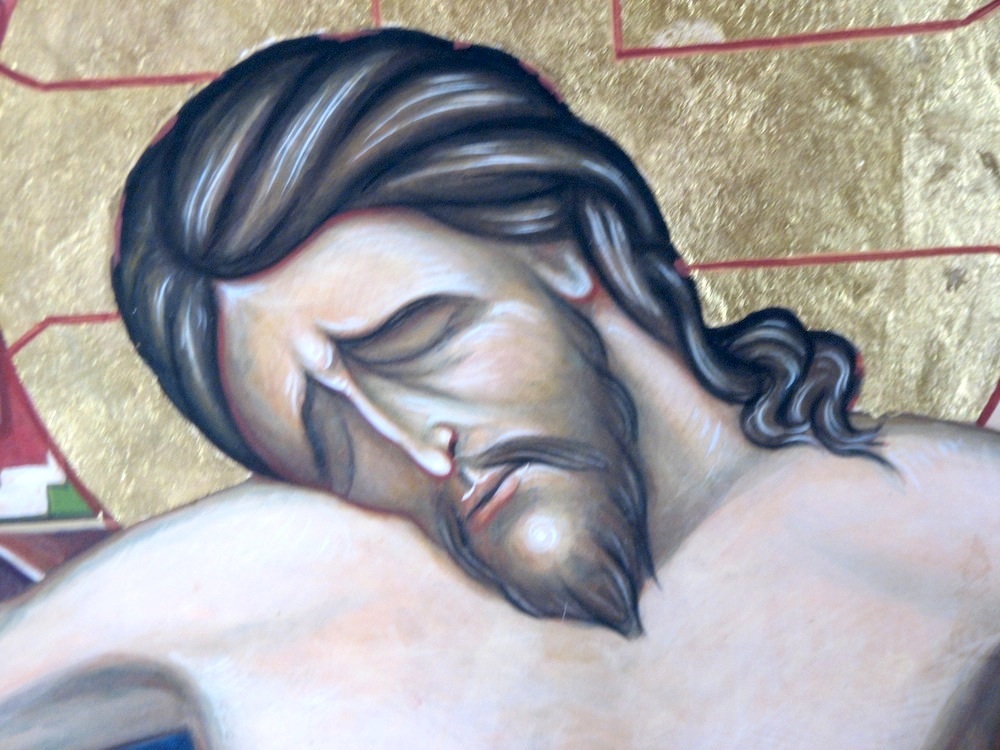 The Church sets aside the next forty days as a period of prayer and penance as a preparation for the Great and Holy Week and the resurrection of our Lord. There are rules about fasting, which we must observe as faithful Christians. However, we must not mistake the true meaning of the Fast. The fast is, truly, a period of spiritual ascesis (struggle), as today’s Gospel tells, us, “Do not store up for yourselves treasures on earth … But store up treasures in heaven” (Matthew 6:19-20). However, it is not like school, where we keep all the class rules and earn gold stars for our obedience. Today’s epistle tells us that the Fast is not about “keeping rules:” “The one who eats must not despise the one who abstains, and the one who abstains must not pass judgment on the one who eats; for God has welcomed him” (Romans 14:3). Yes, we do keep the rules, but we must also transcend the rules.
The Church sets aside the next forty days as a period of prayer and penance as a preparation for the Great and Holy Week and the resurrection of our Lord. There are rules about fasting, which we must observe as faithful Christians. However, we must not mistake the true meaning of the Fast. The fast is, truly, a period of spiritual ascesis (struggle), as today’s Gospel tells, us, “Do not store up for yourselves treasures on earth … But store up treasures in heaven” (Matthew 6:19-20). However, it is not like school, where we keep all the class rules and earn gold stars for our obedience. Today’s epistle tells us that the Fast is not about “keeping rules:” “The one who eats must not despise the one who abstains, and the one who abstains must not pass judgment on the one who eats; for God has welcomed him” (Romans 14:3). Yes, we do keep the rules, but we must also transcend the rules.
The Great Fast is not a period of earning merit points, which leads to pride anyway, but it is a time for a spiritual revolution in our lives. We must turn the values of the world: love for power, love of money, love of pleasure, and self-serving upside down. In our baptism, we promised to renounce “Satan, and all his works, and all his angels and all his service, and all his pride,” and to commit ourselves to Christ. This is especially true in a world which polarizes us into self-righteousness and teaches us hatred for the other. Why, indeed, do we fast? It is to bring about this revolution, foretold by Mary, the Mother of God, “[God] has thrown down the rulers from their thrones but lifted up the lowly. The hungry he has filled with good things; the rich he has sent away empty” Luke 1:52-53).
We must become the humble, the lowly, the hungry and reject the world’s lust for power. In the Great Fast, then, we live out the Lord’s Prayer: “Thy Kingdom come, thy will be done on earth as it is in heaven,” not our own plan for salvation, but God’s plan, God’s will, seen in love for the other, “Give us this day our daily bread,” for we fast from the delightful food of this world, to receive only Christ, who said, “I am the bread of life (John 6:48);” “forgive us our trespasses, as we forgive those who trespass against us,” in unconditional forgiveness, as today’s Gospel reveals, “If you forgive others their transgressions, your heavenly Father will forgive you. But if you do not forgive others, neither will your Father forgive your transgressions (Matthew 6:14-15), and finally, “lead us not into temptation, but deliver us from evil,” for if in the Fast we imitate Jesus, who fasted in the desert for forty days to overcome temptation, then we too will be delivered from evil, but not by our own proud struggles, but by the grace of God. In this fast, we must open ourselves to Christ, who said, “Behold, I make all things new” (Revelation 21:5).
Lenten Regulations 2019
Lenten Regulations 2019 of the Ukrainian Catholic Diocese of Stamford
By the threefold discipline of fasting, prayer and almsgiving the Church keeps the Great Fast/Lent from Monday, March 4 (March 11 – Julian Calendar), after the Cheesefare Sunday to the day before Easter, Holy Saturday, April 20 (April 27 – Julian Calendar).
The following regulations apply, in general, to all Ukrainian Catholics of the Stamford Eparchy between the ages 21-60:
~Abstinence from meat and dairy products on The First Day of the Great Fast, March 4 (March 11), and on Good Friday, April 19 (April 26).
The following regulations apply, in general, to all Ukrainian Catholics of the Stamford Eparchy between the ages 14-60:
~Abstinence from meat is to be observed on all Fridays and the Great Fast.
~Abstinence from meat is suggested and encouraged on all Wednesdays of the Great Fast.
Note: The following are exempt from abstinence: 1. the poor who live on alms; 2. the sick and frail; 3. Convalescents who are returning to their strength; 4. pregnant women and women who are nursing their children; and, 5. persons who perform hard labor.
Meat is to be understood as including not only the flesh, but also those parts of warm-blooded animals that cannot be rendered, i.e., melted down, e.g., the liver, lungs, etc. meat gravy or soup made from meat is included in this prohibition.
Dairy products are to be understood as comprising products derived from mammals and birds, but not regarded as meat, e.g., cheese, lard, butter, milk, eggs, etc.
Eucharistic Fast:
A fast of one hour from food (prior to service starting time) should be kept those receiving the Eucharist at the evening celebration of the Divine Liturgy of the Pre-sanctified Gifts, as well as the Divine Liturgy of St. John Chrysostom and St. Basil the Great.
The Journey to Pascha 2019
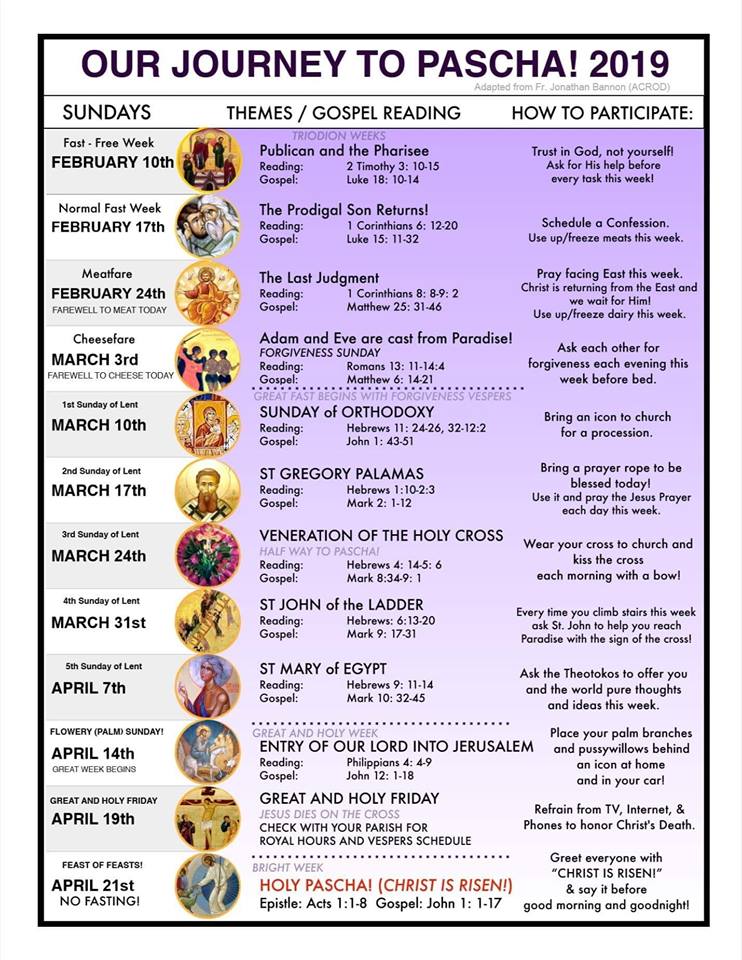
Preparing for Great Lent–Meatfare Sunday
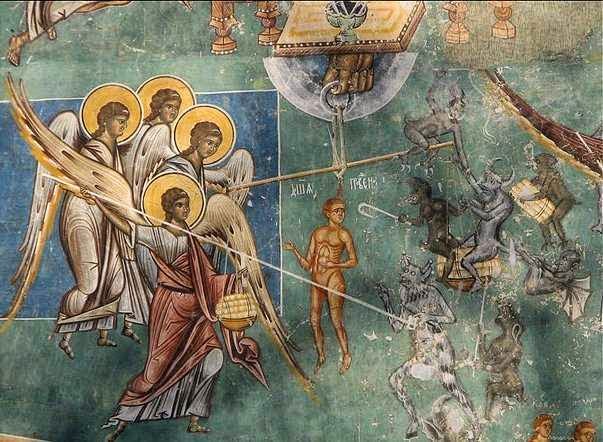 Today the Byzantine Catholic Church observes the last day for eating meat and meat products til Pascha –this is Meatfare Sunday. It is also called Last Judgement Sunday because of the proclamation of the Gospel of Matthew’s 25th Chapter (vv. 31-46).
Today the Byzantine Catholic Church observes the last day for eating meat and meat products til Pascha –this is Meatfare Sunday. It is also called Last Judgement Sunday because of the proclamation of the Gospel of Matthew’s 25th Chapter (vv. 31-46).
Eggs and dairy products are permitted for the coming week. This limited fasting prepares us gradually for the more intense fasting of Great Lent.
The aim of our fasting is meant to free us from bondage of sin and death, from the self-centeredness that causes human misery and keeps us from serving our Lord and Savior Jesus Christ in “the least of these.”
“As Father Alexander Schmemann reminds us in his book GREAT LENT (Ch. 1:4), sin is the absence of love, it is separation and isolation. When Christ comes to judge the world, His criterion for judgment will be love. Christian love entails seeing Christ in other people, our family, our friends, and everyone else we may encounter in our lives. We shall be judged on whether we have loved, or not loved, our neighbor. We show Christian love when we feed the hungry, give drink to the thirsty, clothe the naked, visit those who are sick or in prison. If we did such things for the least of Christ’s brethren, then we also did them for Christ (Mt. 25:40). If we did not do such things for the least of the brethren, neither did we do them for Christ (Mt. 25:45).”
#ByzantineCatholicNewHaven
Lazarus Saturday
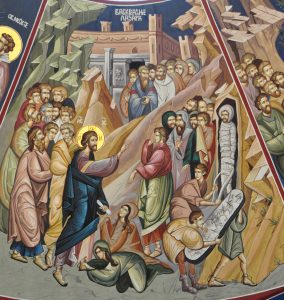 Jesus said to her [Martha], “Your brother [Lazarus] will rise again.” Martha said to him, “I know that he will rise again in the resurrection at the last day.” Jesus said to her, “I am the resurrection and the life; whoever believes in me, though he die, yet shall he live, and whoever lives and believes in me shall never die. Do you believe this?” (John 11:23-26)
Jesus said to her [Martha], “Your brother [Lazarus] will rise again.” Martha said to him, “I know that he will rise again in the resurrection at the last day.” Jesus said to her, “I am the resurrection and the life; whoever believes in me, though he die, yet shall he live, and whoever lives and believes in me shall never die. Do you believe this?” (John 11:23-26)
Blessings!
Wednesday of the Fifth Week
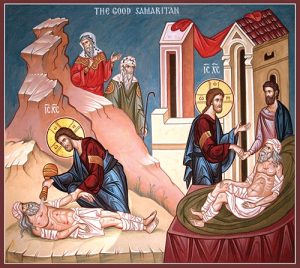 Matins
Matins
O my soul, you have left the heights of virtue and have gone down into the abyss of sin. You have fallen under the blows of the evil robbers, you are covered with wounds; but now cry out to Christ our God, who let himself be wounded and crucified for you: Come to my help, O Savior, and save me.
Wounded by thieves of the soul, how miserable I am! O Lord, I am left half-dead. The rank of prophets passes me by, seeing me close to death, incurable through human knowledge, and in bitter suffering. In the humility of my heart, I cry out to you: O Christ our God most merciful, anoint me with the oil of your mercy.
Vespers
Beaten in spirit and robbed of my mind, I fell among corruptible thieves, who steal away my power to think. My soul has been scourged, and I lie on the path of life stripped of all virtue. A priest sees that I suffer from incurable sores, but passes by without a second glance. A Levite, not wanting to share my deadly pain, looks down on me and also passes by. But you, O Christ our God, though born of Mary and not as a Samaritan, grant me healing because of your love for humankind, and pour out the riches of your mercy upon us.
Reflection
In the fifth week of the Great Fast, we chant the Canon of St. Andrew of Crete. This long poem recounts, though stories from Scripture, the many ways we “have gone down into the abyss of sin.” There is no way to rationalize our sinful ways, so the samohlasens remind that we are “incurable through human knowledge,” that we have been robbed of “our power to think.” We cannot pull ourselves up by our own cleverness and worldly wisdom, but only by the wisdom of God, who is our Lord Jesus Christ. The refrain of all the hymns this week repeat in various expressions: “Come to my help, O Savior, and save me.”
Meditation by Archpriest David Petras
Third Sunday of the Great Fast
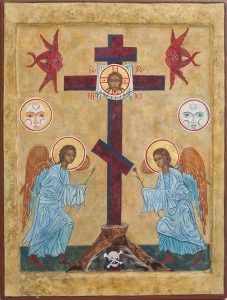 The first half of the Great Fast tells us the stories of Adam and Eve and their children, and the flood of Noah. It is a story of the creation of a perfect world and how that has been marred by human sin. It tells of the end of paradise, “The Lord God therefore banished him from the garden of Eden, to till the ground from which he had been taken. He expelled the man, stationing the cherubim and the fiery revolving sword east of the garden of Eden, to guard the way to the tree of life” (Genesis 3:23-24).
The first half of the Great Fast tells us the stories of Adam and Eve and their children, and the flood of Noah. It is a story of the creation of a perfect world and how that has been marred by human sin. It tells of the end of paradise, “The Lord God therefore banished him from the garden of Eden, to till the ground from which he had been taken. He expelled the man, stationing the cherubim and the fiery revolving sword east of the garden of Eden, to guard the way to the tree of life” (Genesis 3:23-24).
Today, however, begins a new story, and we sing, “No longer does the flaming sword guard the gates of Eden, for the tree of the cross has come to quench it wondrously. The sting of death and the victory of Hades have been driven out. For you, O my Savior, stood and called out to those in Hades: Enter again into paradise.”
The tree of life, which Adam and Eve attempted to seize against the will of God, is the tree of the cross. And the fruit of this tree is the Body of Christ, which we receive in Holy Communion “for the forgiveness of sins and life everlasting.” We receive it together with his Holy Blood, “shed of the life of the world,” for today’s Gospel tells us, “Whoever wishes to come after me must deny himself, take up his cross, and follow me” (Mark 8:34). Today we understand the words of our Lord, “Amen, amen, I say to you, unless you eat the flesh of the Son of Man and drink his blood, you do not have life within you” (John 6:53).
The Romans crucified thousands of people, many of whom were innocent. Yet of all these people, only our Lord Jesus Christ is remembered. This is because it is not the method of torture, or the gruesome of his death that matters, but the infinite love that shone forth from his sacrifice on the cross. This is what is important for us, we may not have to die in such a painful or unjust way, but we do have to be united in the love that God shows forth on the cross. This is what it means “to take up the cross.” I personally think that for each and every one of us, it means denying for ourselves something that we crave very earnestly, a painful self-denial, if you will, for the sake of true deifying love for God and for others. This is why the cross, originally an instrument of torture and shame, has become for us the trophy of salvation. The joy of the Fast is that through God’s love we come to the fullness of life.
The Flood and Baptism
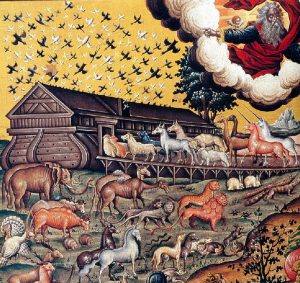 One the key parts of the Great Fast is attending to Baptism. Do we realize the import of Baptism and its roots?
One the key parts of the Great Fast is attending to Baptism. Do we realize the import of Baptism and its roots?
St. John Damascene lists eight baptisms:
1) the Flood, which was the eradication of sin;
2) the sea and the cloud, the baptism of Moses;
3) the baptism of the Law, in which every unclean person washed himself with water (Leviticus 14:8);
4) the baptism of John;
5) the baptism of our Lord;
6) the baptism of repentance and tears;
7) martyrdom, the baptism of blood;
8) the last baptism in hell, which is not saving, but which destroys the soul.
One common theme in all of this is that baptism is a fire, a death, a purification, as we say in the Creed, “I profess one baptism for the remission of sins.”
In this third week of the Great Fast, we remember the first of these, the flood. We are reminded that the Great Fast is a journey, but also a preparation for baptism. It is our weakness today that we do not evangelize people to come into the faith. We no longer see the connection between baptism and the passion and resurrection, as St. Paul did, and which is proclaimed in the Great Paschal Vigil, “Are you unaware that we who were baptized into Christ Jesus were baptized into his death? We were indeed buried with him through baptism into death, so that, just as Christ was raised from the dead by the glory of the Father, we too might live in newness of life” (Romans 6:3-4). Our goal in Pascha is to renew our baptisms, renouncing the evil of Satan and committing ourselves again to Christ, so that “We know that our old self was crucified with him, so that our sinful body might be done away with, that we might no longer be in slavery to sin. (Romans 6:6)”
The flood is a foretelling of the true baptism of our Lord. In both the power of sin is destroyed. The ark represents the loving providence of God; it represents the strength of his grace, working in our human weakness; it represents our faith that life is found in God’s creative wisdom. We must hear last Sunday’s reading, “we must attend all the more to what we have heard, so that we may not be carried away. For if the word announced through angels proved firm, and every transgression and disobedience received its just recompense, how shall we escape if we ignore so great a salvation?” (Hebrews 2:1-3)